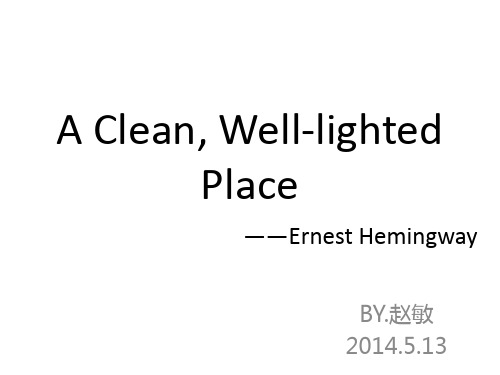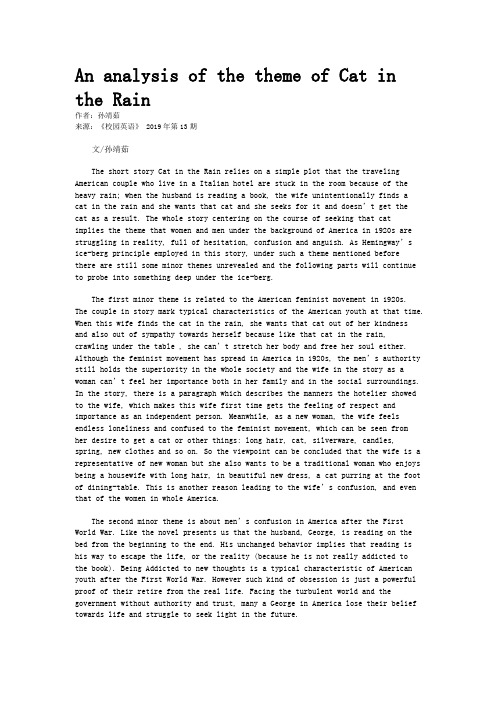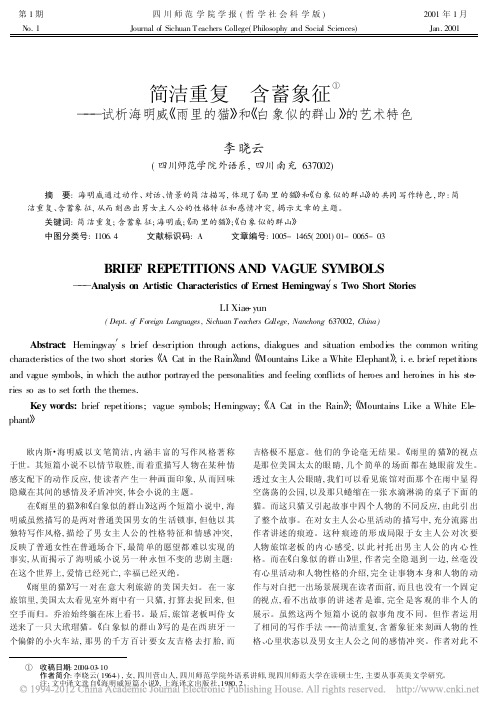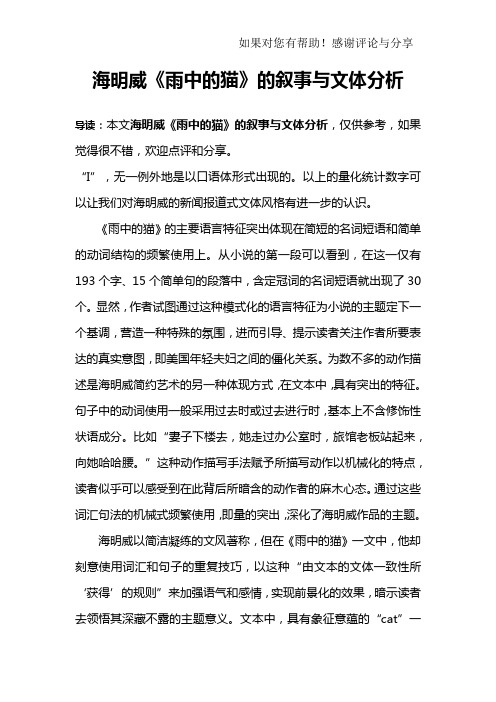Cat in the rain---- Hemingway
译者的隐身_到_译者的彰显__从海明威_雨中的猫_的翻译看归化异化策略的选择

第19卷第4期2006年12月北京航空航天大学学报(社会科学版)Journal of Beijing University of Aeronautics and Astronautics (S ocial Sciences Edition )V ol.19 N o.4December ,2006“译者的隐身”到“译者的彰显”———从海明威《雨中的猫》的翻译看归化异化策略的选择李洁平,吴远庆(鲁东大学外国语学院,山东烟台264025)摘 要:试图通过对海明威《雨中的猫》的原文和曹庸先生的译文的对比,从翻译的特殊视角,运用韦努蒂提出的归化和异化的翻译策略来探讨海明威《雨中的猫》的翻译中译者的角色,指出曹庸先生在翻译海明威《雨中的猫》的过程中选择了异化的策略,从而在形式上使译者的角色得到了彰显。
笔者尝试采用归化的翻译策略对曹庸先生的译文中某些异化译法予以归化翻译,继而提出归化的译法虽然在形式上是“译者的隐身”,但是在翻译的过程和译文的内容上却使译者的角色得到了彰显。
关键词:《雨中的猫》;韦努蒂;归化;异化;译者的角色中图分类号:H059 文献标识码:B 文章编号:100822204(2006)0420061204 收稿日期:2005-10-14 作者简介:李洁平(1961-),女,教授,硕士,研究方向为英美文学与西方文论.From “T ranslator ’s I nvisibility ”to “T ranslator ’s Visibility ”———On Choice of Domestication and F oreignization Strategies inTranslating Hemingway ’s Cat in the RainLI Jie 2ping ,WU Yuan 2qing(F oreign Language School ,Ludong University ,Y antai 264025,China )Abstract :Drawing on the domesticating and foreignizing translation theory proposed by Lawrence Venuti ,the article attem pts to explore the translator ’s role by com paring and analysing the original text of Heming way ’s Cat in the Rain and its translated version by Cao Y ong from the perspective of translation.The article points out that Cao Y ong adopted foreignizing strategy in translating Heming way ’s Cat in the Rain s o as to give prominence to the translator ’s role in the form.The writer of this article experiments with domesticating strategy in translating those parts of Cat in the Rain that were rendered into Chinese by Cao Y ongby using foreignizing strategy.Finally ,the writer points out that although do 2mesticating strategy can cause “the translator ’s invisibility ”in the form ,it can als o give prominence to the translator ’s role in the translating process and the content of the translated version.K ey w ords :Cat in the Rain ;Venuti ;domestication ;foreignization ;translator ’s role 海明威的短篇小说《雨中的猫》原文只有1149个单词,曹庸先生的译文也只有1937个字。
ErnestHemingway海明威人物介绍theLostGeneration迷惘的一代

suicide
• Discouraged by a troubled family background, illness and the belief that he was losing his gift for writing, he "quite deliberately" shot himself with his favorite shotgun in the early morning hours of July 2, 1961.
服务队)
• on July 8, 1918, he wounded but carried an Italian soldier to safety, received the Italian Silver Medal of Bravery
• when in the hospital, he met and fell in love with Agnes, a Red Cross nurse but rejected
Definition of Code Hero
• Hemingway defined the Code Hero as "a man who lives correctly, following the ideals of honor, courage and endurance in a world that is sometimes chaotic, often stressful, and always painful."
》 • 1940: For Whom the Bell Tolls 《丧钟为谁
美国文学-海明威

Theme
• It express the indifference of people after WWI even between the couple: one(man) remains dominant and repressive, lack of affection, while the other is trying to change and improve the situation. In contrast, it is the hotelkeeper who sends her the cat and gives her attention she needed and what she can’t get from her husband. In fact, she didn’t need a cat. She just needs care and love from her husband.
Summary
• At last, the old waiter recites to himself the Lord’s Prayer, but he replaces most parts with “nada”. (the Spanish word for “nothing.”) On his way home, the waiter stops at a bar, but leaves quickly, because the bar is unpolished. He goes back home but keep awake until dawn. He tells himself, “it is probably only insomnia.” “Many must have it.”
An analysis of the theme of Cat in the Rain

An analysis of the theme of Cat in the Rain作者:孙靖茹来源:《校园英语》 2019年第13期文/孙靖茹The short story Cat in the Rain relies on a simple plot that the traveling American couple who live in a Italian hotel are stuck in the room because of the heavy rain; when the husband is reading a book, the wife unintentionally finds acat in the rain and she wants that cat and she seeks for it and doesn’t get thecat as a result. The whole story centering on the course of seeking that catimplies the theme that women and men under the background of America in 1920s are struggling in reality, full of h esitation, confusion and anguish. As Hemingway’s ice-berg principle employed in this story, under such a theme mentioned beforethere are still some minor themes unrevealed and the following parts will continue to probe into something deep under the ice-berg.The first minor theme is related to the American feminist movement in 1920s. The couple in story mark typical characteristics of the American youth at that time. When this wife finds the cat in the rain, she wants that cat out of her kindnessand also out of sympathy towards herself because like that cat in the rain,crawling under the table , she can’t stretch her body and free her soul either. Although the feminist movement has spread in America in 1920s, the men’s authority still holds the superiority in the whole society and the wife in the story as a woman can’t feel her importance both in her family and in the social surroundings. In the story, there is a paragraph which describes the manners the hotelier showed to the wife, which makes this wife first time gets the feeling of respect and importance as an independent person. Meanwhile, as a new woman, the wife feels endless loneliness and confused to the feminist movement, which can be seen fromher desire to get a cat or other things: long hair, cat, silverware, candles, spring, new clothes and so on. So the viewpoint can be concluded that the wife is a representative of new woman but she also wants to be a traditional woman who enjoys being a housewife with long hair, in beautiful new dress, a cat purring at the foot of dining-table. This is another reason leading to the wife’s confusion, and even that of the women in whole America.The second minor theme is about men’s confusion in America after the First World War. Like the novel presents us that the husband, George, is reading on the bed from the beginning to the end. His unchanged behavior implies that reading is his way to escape the life, or the reality (because he is not really addicted tothe book). Being Addicted to new thoughts is a typical characteristic of American youth after the First World War. However such kind of obsession is just a powerful proof of their retire from the real life. Facing the turbulent world and the government without authority and trust, many a George in America lose their belief towards life and struggle to seek light in the future.The last but not least, crisis in marriage is another minor theme which is presented to us. Although in story George gives his help to his wife at thebeginning when the w ife put forwards seeking the cat, George doesn’t show his earnest concern to his wife. After his wife come back with disappointment, heinquires the result briefly and resume to read. When his wife complains about the current situation and a lot of things she wanted, like the cat, new clothes, long hair, candles, silverware, he impatiently says: “ shut up, get something to read.” As George’s wife, she cannot realize her importance from George while this kind of importance, consideration she should feel from a stranger, the hotelier. So the communication between George and his wife is a failure. The basic bridge, communication, is broken between them. Moreover, the mutual trust, understandingcan not exist. So crisis in marriage is arising.In conclusion, the theme of Cat in the Rain reveals that women and men of America in 1920s are both in dilemma of life struggling for the light of future. George’s family, as a representative of thousands of American family, implies that the confusion and annoyance of husband and wife differ from each other, and which subsequently causes the obstacle of communication between the husband and the wife, even the crisis of their marriage.References:[1]海明威.雨中的猫.海明威短篇小说集[M].上海:上海译文出版社, 2003,10.[2]张龙海.海明威短篇小说的主题思想和美学价值[J].当代外国文学,1998(2).[3]贾艳萍.女人和猫—析海明威短篇小说《雨中的猫》的象征意义[J].2006(09).[4]王慧玲.《雨中的猫》中猫的意象解读[J].青年文学家,2016(36).【作者简介】孙靖茹(1992-),女,汉族,陕西汉中人,海南大学,硕士,学生,英语语言文学。
简洁重复含蓄象征_试析海明威_雨_省略_猫_和_白象似的群山_的艺术特色_李晓云

简洁重复 含蓄象征¹)))试析海明威5雨里的猫6和5白象似的群山6的艺术特色李晓云(四川师范学院外语系,四川南充637002)摘 要:海明威通过动作、对话、情景的简洁描写,体现了5雨里的猫6和5白象似的群山6的共同写作特色,即:简洁重复、含蓄象征,从而刻画出男女主人公的性格特征和感情冲突,揭示文章的主题。
关键词:简洁重复;含蓄象征;海明威;5雨里的猫6;5白象似的群山6中图分类号:I10614文献标识码:A文章编号:1005-1465(2001)01-0065-03BRIEF REPETITIONS AND VAGUE SYMBOLS)))Analysis on A rtistic C haracteristics of Ernest Hemingway c s Two Short StoriesLI Xiao -yun(Dept.of Foreign Languages ,Sichuan T eachers College,Nanchong 637002,China)Abstract :Heming way c s brief desc ription through actions,dialogues and situation embodies the common writing charac teristics of the two short stories 5A Cat in the Rain 6and 5Mountains Like a White Elephant 6,i.e.brief repetitions and va gue symbols,in which the author portrayed the personalities and feeling conflic ts of heroes and heroines in his sto -ries so as to set forth the themes.Key words:brief repetitions;vague symbols;He mingway;5A Cat in the Rain 6;5Mountains Like a White Ele -phant 6欧内斯#海明威以文笔简洁,内涵丰富的写作风格著称于世。
海明威《雨中的猫》的叙事与文体分析_1

海明威《雨中的猫》的叙事与文体分析导读:本文海明威《雨中的猫》的叙事与文体分析,仅供参考,如果觉得很不错,欢迎点评和分享。
“I”,无一例外地是以口语体形式出现的。
以上的量化统计数字可以让我们对海明威的新闻报道式文体风格有进一步的认识。
《雨中的猫》的主要语言特征突出体现在简短的名词短语和简单的动词结构的频繁使用上。
从小说的第一段可以看到,在这一仅有193个字、15个简单句的段落中,含定冠词的名词短语就出现了30个。
显然,作者试图通过这种模式化的语言特征为小说的主题定下一个基调,营造一种特殊的氛围,进而引导、提示读者关注作者所要表达的真实意图,即美国年轻夫妇之间的僵化关系。
为数不多的动作描述是海明威简约艺术的另一种体现方式,在文本中,具有突出的特征。
句子中的动词使用一般采用过去时或过去进行时,基本上不含修饰性状语成分。
比如“妻子下楼去,她走过办公室时,旅馆老板站起来,向她哈哈腰。
”这种动作描写手法赋予所描写动作以机械化的特点,读者似乎可以感受到在此背后所暗含的动作者的麻木心态。
通过这些词汇句法的机械式频繁使用,即量的突出,深化了海明威作品的主题。
海明威以简洁凝练的文风著称,但在《雨中的猫》一文中,他却刻意使用词汇和句子的重复技巧,以这种“由文本的文体一致性所‘获得’的规则”来加强语气和感情,实现前景化的效果,暗示读者去领悟其深藏不露的主题意义。
文本中,具有象征意蕴的“cat”一词出现了14次,其近义词“kitty”出现了7次,贯穿全文始末。
当女主人公从旅店老板前经过时,以“She liked……”开头的排比结构出现了6次。
在随后的夫妻第二次对话中,以“I want……”这样的排比句重复使用了11次,跨距达6个自然段。
这种超常规的重复手法使语言出现了所谓的“组合式”前景化现象。
“量的突出”客观上增强了语言表达的张力,其叠加效应便形成了“质的突出”,越发凸显出女主人公内心深处的孤独寂寥,使文本的主题意义得到了更进一步的深化。
浅析海明威《雨中的猫》
浅析海明威《雨中的猫》作者:高艳来源:《青年文学家》2019年第26期摘; 要:美国著名作家海明威的写作风格简明扼要。
他的作品容易阅读,但却常常被误解为简单甚至过分简单。
然而,这种写作风格其实源于海明威所说的“冰山理论”。
因此,阅读海明威的小说,读者必须仔细阅读故事文本,寻找人物的线索,解读作者使用的各种文学表现手法。
本文拟据此简要分析海明威的短篇小说《雨中的猫》。
关键词:冰山理论;孤独;象征手法作者简介:高艳,女,汉族,1978年生,硕士,讲师,西安翻译学院英文学院教师,研究方向:英美文学。
[中图分类号]:I106; [文献标识码]:A[文章编号]:1002-2139(2019)-26--01欧内斯特·米勒·海明威(1899-1961),美国作家、记者,被认为是20世纪最著名的小说家之一。
他是美国“迷惘的一代”作家中的代表人物,其作品中对人生、世界、社会都表现出了迷茫和彷徨。
他是美利坚民族的精神丰碑,在美国文学史乃至世界文学史上都占有重要地位。
海明威的写作风格简明扼要。
但却常常被误解为简单甚至过分简单。
然而,这种写作风格其实源于海明威所说的“冰山理论”。
在海明威的冰山理论中,他宣称他通过作品要向读者传达的信息中有八分之七是在作品故事的表面之下的,就像一座冰山被淹没的那部分一样。
因此,读海明威的小说,读者必须仔细阅读故事文本,寻找人物的线索,解读作者使用的各种文学表现手法。
短篇小说《雨中的猫》是海明威于1925年作为短篇小说集的一部分首次出版。
故事发生在意大利的小镇上,这显然是受他在第一次世界大战期间作为一名红十字会工作人员在意大利的经历所影响。
这个故事是他在这个时期发展起来的简洁、精练的写作风格的一个典型例子。
每个词都有意义,每个图像都有原因,每个标点符号都很重要。
这是一个读者必须花更多的时间思考而不是阅读的小说。
故事本身很简单。
在意大利海岸的一家旅馆里,一个雨天,一对美国夫妇在他们的旅馆房间里打发时间,妻子在雨中发现了一只猫,之后产生了想要这只猫的想法,但却寻而不果。
综合英语教程第四册4单元4-04-Part 3
Book 4-Unit 4
The Iceberg Principle
Hemingway is famous for his Iceberg Principle, that is, to present the story with simple sentences and dialogues and leave a large space for readers to explore, to reflect. It was just like the iceberg, which had only one-eighth part on the water and seven-eighths part under the water.
The main working corollary of Hemingway’s “iceberg principle” is that the full meaning of the text is not limited to moving the plot forward: there is always a web of association and inference, a submerged reason behind the inclusion (or even the omission) of every detail.
Book 4-Unit 4
Summary of the Story
The story is about an American couple that spends their holidays in an Italian hotel. It is a __ra_i_n_y_ day and the American woman sees _a__ca_t_i_n_th_e__ra_i_n_, which she wants to protect from the raindrops. When she goes out of the hotel, which is kept by an old __It_a_li_an__ who really seems to do everything to please that woman, and wants to get the cat, it is gone. After returning to the hotel room, she starts a conversation with __h_e_r_h_u_s_b_an_d___, who is __r_e_a_d_in_g__ all the time, telling him how much she wants to have a cat and other things, for instance _h_e_r_o_w_n__si_lv_e_r_to__e_a_t _w_it_h. Her husband seems to be annoyed by that and not interested at all. At the end of the story there is a knock on the door and the maid stands there holding a cat for the American woman in her hands.
母语语感①及联想在翻译中的运用——评曹庸给海明威短篇小说《雨中猫》所作之翻译
母语语感①及联想在翻译中的运用——评曹庸给海明威短篇小说《雨中猫》所作之翻译Instinctive Feeling for Language and Association in Translating——on Cao Yong’s Translation of Hemingway’s Cat in the RainZhang YuhongAbstract: Interlingual translation or translation proper is common between various language owing to the resemblance in human thoughts. However, historically developed, language differs widely and nationally, of which instinctive feeling for one’s mother tongue is one of the most distinctive. Meanwhile, used properly, it can help to eliminate faulty wording for the translator. Words are context-bounded, leading to their different associative meanings. Comparatively studied in Cao Yong’s translation of Hemingway’s Cat in the Rain, in translating expressiveness could be achievedby means of practical association and correct instinctive feeling for language.Key words: instinctive feeling for language;association;translating张玉宏2005010690[摘要] 人类思维的共性使得语言之间的交际得以广泛存在。
13- Ernest Hemingway海明威
story. 5. Code Hero: His protagonists are typically stoic males
-- emptiness and Isolation of one’s soul and spirit
-- Meaninglessness and disillusion of life
-- Absurdity of the world 小说中竭力表现的一种勇气是面对生活中无法弥补的 悲剧所需要的抗争意识和人格尊严;孤寂的心灵需要 这样的勇气,否则人类将走向灭亡。
Hemingway trying his hand at bullfighting in Pamplona, Spain
Here, he can be seen (right of center, in white pants and dark sweater) confronting a charging bull.
Lecture 13:
Earnest Hemingway (1899—1961)
Ernest M. Hemingway (1899 - 1961)
★Ernest Miller Hemingway was an American novelist, short-story writer, and journalist.
• iceberg theory embodied in the strategy of short words, lively conversations, and simple syntax makes thiory
- 1、下载文档前请自行甄别文档内容的完整性,平台不提供额外的编辑、内容补充、找答案等附加服务。
- 2、"仅部分预览"的文档,不可在线预览部分如存在完整性等问题,可反馈申请退款(可完整预览的文档不适用该条件!)。
- 3、如文档侵犯您的权益,请联系客服反馈,我们会尽快为您处理(人工客服工作时间:9:00-18:30)。
There were only two Americans stopping at the hotel. They did not know any of the people they passed on the stairs on their way to and from their room. Their room was on the second floor facing the sea. It also faced the public garden and the war monument. There were big palms and green benches in the public garden. In the good weather there was always an artist with his easel. Artists liked the way the palms grew and the bright colors of the hotels facing the gardens and the sea. Italians came from a long way off to look up at the war monument. It was made of bronze and glistened in the rain. It was raining. The rain dripped from the palm trees. Water stood in pools on the gravel paths. The motor cars were gone from the square by the war monument. Across the square in the doorway of the cafe a waiter stood looking out at the empty square. The American wife stood at the window looking out. Outside right under their window a cat was crouched under one of the dripping green tables. The cat was trying to make herself so compact that she would not be dripped on. "I'm going down and get that kitty,” the American wife said. "I'll do it,"her husband offered from the bed. "No, I'll get it. The poor kitty out trying to keep dry under a table." The husband went on reading, lying propped up with the two pillows at the foot of the bed. "Don't get wet,"he said. The wife went downstairs and the hotel owner stood up and bowed to her as she passed the office. His desk was at the far end of the office. He was an old man and very tall. "Il piove [It's raining]," the wife said. She liked the hotel-keeper. "Si, si, Signora, brutto tempo. It is very bad weather." He stood behind his desk in the far end of the dim room. The wife liked him. She like the deadly serious way he received any complaints. She liked his dignity. She liked the way he wanted to serve her. She liked the way he felt about being a hotel-keeper. She liked his old, heavy face and big hands. Liking him she opened the door and looked out. It was raining harder. A man in a rubbercape was crossing the empty square to the cafe. The cat would be around to the right. Perhaps she could go along under the eaves. As she stood in the doorway an umbrella opened behind her. It was the maid who looked after their room. "You must not get wet," she smiled, speaking Italian. Of course, the hotel keeper had sent her. With the maid holding the umbrella over her, she walked along the gravel path until she was under their window. The table was there, washed bright green in the rain, but the cat was gone. She was suddenly disappointed. The maid looked up at her. “Ha perdutoqualquecosa, Signora? [Have you lost something, Madam?]” “There was a cat,” said the? American girl. “A cat?” “Si, ilgatto. [Yes, a cat.]” “A cat?” the maid laughed. “A cat in the rain?” “Yes,” she said, “under the table.” Then: “Oh. I wanted it so much. I wanted a kitty.” When she spoke English the maid’s face tightened. “Come, Signora,” she said. “We must get back inside. You will be wet.” “I suppose so,” said the American girl. They went back along the gravel path and passed in the door. The maid stayed outside to close the umbrella. As the American girl passed the office, the padrone bowed from his desk. Something felt very small and tight inside the girl. The padrone made her feel very small and at the same time really important. She had a momentary feeling of being of supreme importance. She went on up the stairs. She opened the door of the room. George was on the bed, reading. “Did you get the cat?” he asked, putting the book down. “It was gone.” “Wonder where it went to,” he said, resting his eyes from reading. She sat down on the bed. “I wanted it so much,” she said. “I don’t know why I wanted it so much. I wanted that poor kitty. It isn’t any fun to be a poor kitty out in the rain.” George was reading again. She went over and sat in front of the mirror of the dressing table looking at herself with the hand glass. She studied her profile, first one side and then the other. Then she studied the back of her head and her neck. “Don’t you think it would be a good idea if I let my hair grow out?” she asked, looking at her profile again. George looked up and saw the back of her neck, clipped close like a boy’s. “I like it the way it is.” “I get so tired of it,” she said. “I get so tired of looking like a boy.” George shifted his position in the bed. He hadn’t looked away from her since she started to speak. “You look pretty darn nice,” he said. She laid the mirror down on the dresser and went over to the window and looked out. It was getting dark. “I want to pull my hair back tight and smooth and make a big knot at the back that I can feel,” she said. “I want to have a kitty to sit on my lap and purr when I stroke her.” “Yeah?” George said from the bed. “And I want to eat at a table with my own silver and I want candles. And I want it to be spring and I want to brush my hair out in front of a mirror and I want a kitty and I want some new clothes.” “Oh, shut up and get something to read,” George said. He was reading again. His wife was looking out of the window. It was quite dark now and still raining in the palm trees. “Anyway, I want a cat,” she said, “I want a cat. I want a cat now. If I can’t have long hair or any fun, I can have a cat.” George was not listening. He was reading his book. His wife looked out of the window where the light had come on in the square. Someone knocked at the door. “Avanti [Come in],” George said. He looked up from his book. In the doorway stood the maid. She held a big tortoise-shell cat pressed tight against her and swung down against her body. “Excuse me,” she said, “the padrone asked me to bring this for the Signora.”
